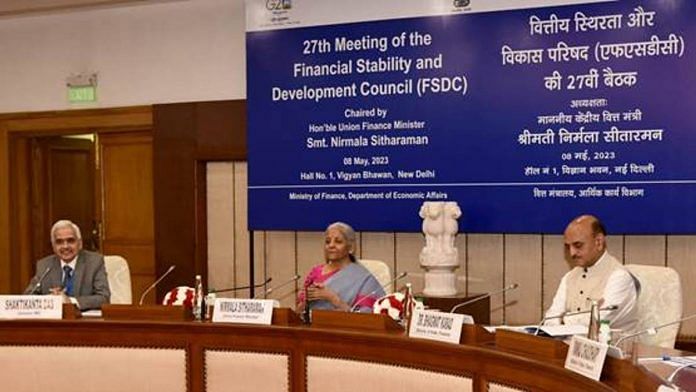New Delhi: Maintaining financial stability and “being on our toes” is a shared responsibility of all financial sector regulators in India in light of the challenges from the global economy, Economic Affairs Secretary Ajay Seth told reporters following a meeting of the Financial Stability and Development Council (FSDC) Monday.
Finance Minister Nirmala Sitharaman chaired the 27th meeting of the FSDC in the Capital Monday. This was the first meeting of the council after the announcement of Union Budget 2023-24 on 1 February 2023.
The FSDC is a high-level council comprising the senior-most officials in the ministries of finance and corporate affairs, as well as the heads of all financial sector regulators.
According to Seth, the council discussed a wide range of topics, including how to ease KYC norms for customers, how to give investors the quickest access to their unclaimed dividends, deposits, and shares, and how to put in place an early warning system to mitigate financial stress.
“The council discussed a number of issues, starting with the issue of financial stability, noting that there are daunting challenges coming from the global economy and global perspective,” Seth said.
“It was noted that maintaining financial stability, being on our toes to maintain the stability of our economy, is a shared responsibility and all the members would be working towards that,” he added.
He also said there were no spill-over effects from the banking crises in either the US or Europe that would negatively affect India or its financial system.
The high-level meeting was attended by the ministers of state for finance Pankaj Chaudhary and Bhagwat Kishanrao Karad, apart from Reserve Bank of India governor Shaktikanta Das, all secretaries in the ministries of finance and corporate affairs, and Chief Economic Adviser V. Anantha Nageswaran.
The FSDC also includes the chiefs of all other financial regulators such as Securities and Exchange Board of India (SEBI), Insurance Regulatory and Development Authority of India (IRDAI), Pension Fund Regulatory and Development Authority (PFRDA), Insolvency and Bankruptcy Board of India (IBBI), and the International Financial Services Centres Authority (IFSCA), all of whom were in attendance.
Also read: SVB collapse reminds us of 1826 UK banking crisis. It can teach regulators how to fix economy
Cybersecurity on agenda
Seth said the “council discussed the issue of cybersecurity at a time when the economy and the financial sector are becoming more digitalised”. The council, he added, noted that “a much higher level of preparedness is needed for cybersecurity of all regulated entities, especially the large, systemically important regulated financial institutions, as well as financial market infrastructure”.
Seth highlighted the fact that, in many cases, deposits, dividends, and stocks are left unclaimed by investors or their nominees, due to a lack of knowledge about the existence of these assets.
“The council decided that the relevant regulators should conduct drives, in cases where the contact details of nominees are there, to reach out to them in a time-bound manner,” Seth said. “Where the nominee details are not there, a process has to be put in place.”
The economic affairs secretary further said that an expert committee had submitted a “comprehensive” report on how KYC norms could be eased for customers. He added that the council discussed the report and what additional steps were needed.
“The council also discussed issues relating to early warning indicators for the economy,” Seth pointed out. “These are a set of indicators that allow financial stress to be noticed well in time so that corrective measures can be taken.”
The government and regulators already have such a system in place, he added, which captures information from financial markets, global markets, as well as the real economy.
(Edited by Nida Fatima Siddiqui)
Also read: How India’s economy fared in a year of shocks, aftershocks & slowing global growth



